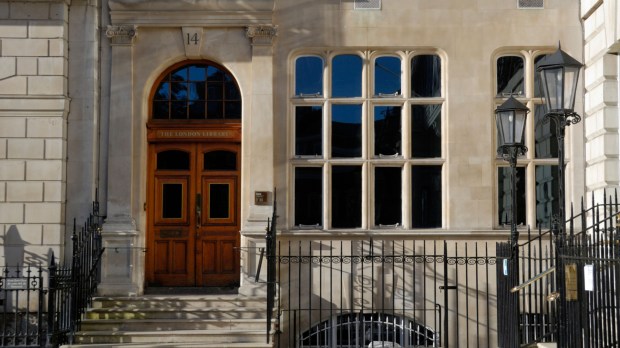Zakhar Prilepin is a well-known novelist in Russia and an ultra-nationalist warrior in Donbas. Once a member of the National Bolshevik party (yes, the left/right implications of its name are as bad as they sound), he is now a strong Putin supporter. He appeared on Russian state TV last Sunday to emphasise that the Russians should not try to appear nice and humane to the West (not a clear and present danger, one would have thought). Prilepin argued that Russia’s approach should be as harsh as possible: ‘If they [the West] are seriously afraid of the conflict with Russia, of WWIII, of nuclear war or the escalation of the conflict, we should be convincing them that we’re ready for it, that we love it, that we like to make war.’ I regret to say he is completely right. He has a better grasp of how to spread doubt and fear in your opponent than does President Biden, whose approach is almost the opposite. Among western leaders, existing or retired, Tony Blair seems to be the only one pointing out that loudly announcing all the things you won’t do in the face of ultra-aggression is not a deterrent to adventurism but an invitation. President Biden says Putin has ‘his back to the wall’; but where is Biden’s wall?
On Tuesday, I happened to watch a short online video from the Polish/Ukrainian border. David Fox-Pitt of Siobhan’s Trust (set up in memory of the much-loved Siobhan Dundee) was enthusiastically promoting the charity’s pizzas, biscuits, tea and coffee served to the refugees to help them get through the -10˚C night. He spoke of how most of those helped were women and children because their husbands, fathers and even grandfathers had stayed to fight. It reminded me of a key factor in the warm welcome people are giving fleeing Ukrainians, in Britain and across Europe. Naturally, women and children arouse more sympathy and less suspicion than unattached young men, but the added ingredient is that we feel that helping these families in this way is part of the war effort. If the men staying behind to fight know that their families are safe and well, their morale will be so much higher.
Like most people, we have recently received the supplier’s estimate of our new annual electricity spend from 1 April, when prices increase by 54 per cent. It comes in at just under £4,000. Our new gas bill will be more than double that. ‘We know this is a big increase but we’re here to help,’ says EDF. Calor, our gas supplier, says it will now only ‘part-fill’ our tank to 70 per cent capacity, a decision which will surely increase the ‘unprecedented volume of calls’ it always complains of when you ring up. In September last year, announcing an earlier price rise of about 15 per cent, Calor was promising ‘effortless top ups’. Now no supply will reach the top of the tank. I am just old enough to remember the energy crises of the 1970s. In many ways, they were worse – especially the industrial disputes which resulted and the acute shortages (though more of both may now be on the way). But I do not remember such huge energy price jumps, particularly when one bears in mind that the general level of inflation today is still lower than then and therefore the real cost of the energy increases is greater. Normally, such increases transform politics, driving ruling parties out of power. Yet Labour’s lead over the Tories is shrinking. Can this trend continue after the price rises kick in? If so, why?
Wales is the part of the United Kingdom I know least well, so I cannot speak with authority, but I do question the Welsh government decision to criminalise the principality’s parents if they smack their children. Does Mark Drakeford, the First Minister, have such a dark view of his compatriots that he thinks their homes must be policed in this way? Are there not laws already which punish actual cruelty to children? Or is he simply trying to frighten them from crossing the border, where his law does not apply? Devolved politicians love exterior bogeymen. I can imagine Welsh kiddies being warned not to catch the train at Knighton, say, or pass over the bridge from Chepstow to Sedbury, thus entering, in both cases, the smacking-friendly zone of England.
You have until Sunday to apply to be a member of the Contested Heritage Committee of the C of E’s Church Buildings Council. ‘This committee will focus on the Church’s priority of racial justice as it is manifested in the material culture in our churches and cathedrals,’ says the advertisement for the (unpaid) posts. Experts are sought on areas which include 17th- to 19th-century slavery, ‘the implicit and explicit representations of works of art’, and a ‘liturgist with an understanding of racial justice’. ‘Applications from PGM (People of Global Majority) professionals are especially welcomed, to address the exclusive dominance of white voices among our members.’ This suggests that though the Council says it wants ‘diverse perspectives to bear on the significance of Church of England churches and cathedrals and the challenges they face’, no one who opposes the removal or alteration of church heritage in response to pressure-group clamour need apply. What is described as ‘diverse’ is in fact uniform and contradicts the slogan of ‘Excellence, Respect, Integrity’ which, the Council says, are ‘the three values in everything we do’.
Those who care about the Church’s legal responsibility for heritage might better apply for one of the Council’s six conservation committees – on ‘Bells, Clocks, Organs, Paintings & Wall Paintings, Sculpture & Furnishings, Stained Glass’. But it will be dispiriting to sign up and then find that the same Council’s committee wants to remove the objects you are seeking to conserve. As we go to press, the court has refused Jesus College, Cambridge’s petition to remove the Rustat memorial from its chapel. So can the politicised Contested Heritage Committee really go ahead?
Got something to add? Join the discussion and comment below.
Get 10 issues for just $10
Subscribe to The Spectator Australia today for the next 10 magazine issues, plus full online access, for just $10.
You might disagree with half of it, but you’ll enjoy reading all of it. Try your first month for free, then just $2 a week for the remainder of your first year.















Comments
Don't miss out
Join the conversation with other Spectator Australia readers. Subscribe to leave a comment.
SUBSCRIBEAlready a subscriber? Log in